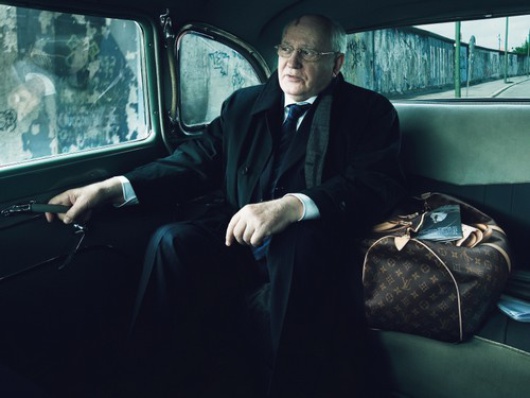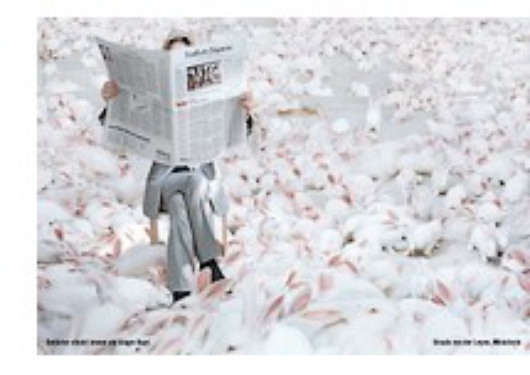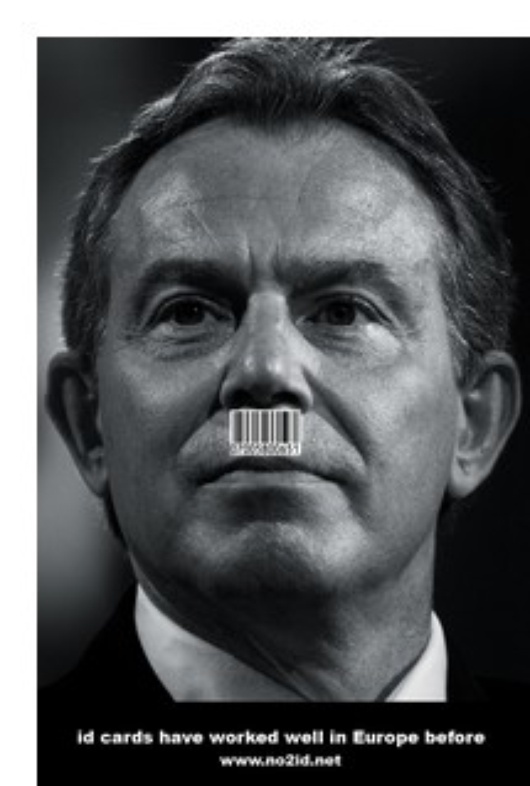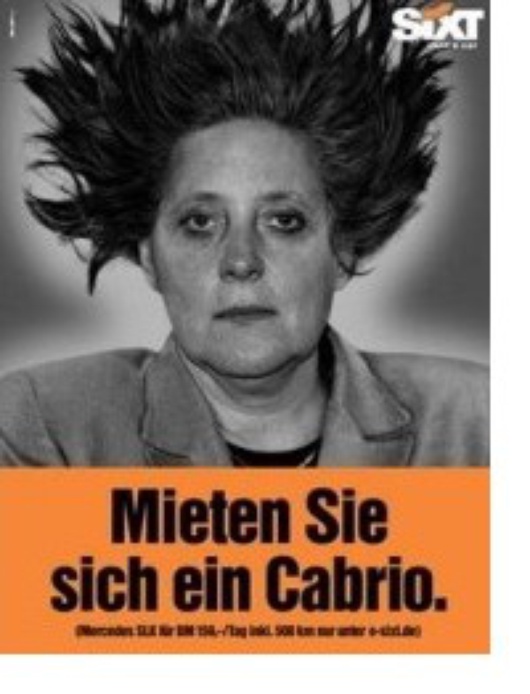Mikhail Gorbachev does Louis Vuitton
Published on
Translation by:
 sarah pybus
sarah pybus
Politicians in advertising, advertising in politics – an ambivalent relationship
 The glossy advert requires a double take. A man in his later years sits on the back seat of a black limousine, the Berlin wall in the background and a patterned travelling bag on the seat beside him. In itself, not a striking image – but the man is Mikhail Gorbachev, 76, former head of state of the Soviet Union. The travelling bag is by Louis Vuitton, the photo a part of an advertising campaign for the French designer label. The impact of the image changes immediately and raises an important question: Do politicians and advertising go together?
The glossy advert requires a double take. A man in his later years sits on the back seat of a black limousine, the Berlin wall in the background and a patterned travelling bag on the seat beside him. In itself, not a striking image – but the man is Mikhail Gorbachev, 76, former head of state of the Soviet Union. The travelling bag is by Louis Vuitton, the photo a part of an advertising campaign for the French designer label. The impact of the image changes immediately and raises an important question: Do politicians and advertising go together?
(Photo: Annie Leibovitz/ LVMH)
This is not the first time that the father of perestroika has appeared in an advertising campaign. In 1997, together with his granddaughter, he shot a television commercial for Pizza Hut and made one million dollars, which he donated to the library run by his foundation. In 2000, he also extolled the virtues of the new ÖBB (Austrian rail) transport network.
Conservative  German daily Frankfurter Allgemeine Zeitung (FAZ) also caused an uproar last October in depicting Ursula von der Leyen, the Federal Minister for Family Affairs, in the middle of a hoard of white rabbits with the slogan Dahinter steckt immer ein kluger Kopf ('There’s a mastermind behind FAZ'), an allusion to the country's problem with the birth rate.
German daily Frankfurter Allgemeine Zeitung (FAZ) also caused an uproar last October in depicting Ursula von der Leyen, the Federal Minister for Family Affairs, in the middle of a hoard of white rabbits with the slogan Dahinter steckt immer ein kluger Kopf ('There’s a mastermind behind FAZ'), an allusion to the country's problem with the birth rate.
It may, at first, seem morally ambiguous for politicians to advertise consumer products. However, Dr. Marcus Maurer, publicist for Johannes Gutenberg University in Mainz, remarks dryly that Gorbachev had long since retired from politics, and that, as a highbrow daily newspaper, the FAZ is, in a general sense, involved in politics. Therefore, is the commercial marketing of politicians merely a minor phenomenon? Aside from advertising projects based on caricatures and some involving the media, politicians generally do not get involved in anything that could be classed as advertising.
Unknowing participants
Conversely, there has been a boom in advertising campaigns using the faces of politicians without their knowledge. Wolfgang Schüssel (chancellor of Austria between 2000 and 2007) apparently posed for MacDonalds in the Austrian national colours – slogan: Österreich isst Weltmeister ('Austria eats world champions'), whilst French politicians François Bayrou, Nicolas Sarkozy, Ségolène Royal and Jack Lang appear in an advert for the French radio station Europe1, looking radiant in fashionable clothes. Last year, the 'No2ID'  campaign against the introduction of ID cards in Great Britain used an image of Tony Blair, the former prime minister, with a barcode stamped on the middle of his upper lip, reminiscent of the 'two-finger' moustache sported by Adolf Hitler.
campaign against the introduction of ID cards in Great Britain used an image of Tony Blair, the former prime minister, with a barcode stamped on the middle of his upper lip, reminiscent of the 'two-finger' moustache sported by Adolf Hitler.
One thing is clear: Europe’s politicians were not drawn into this marketing situation of their own free will. The usually serious depiction of politicians in the media has been turned completely on its head by the advertising world: sarcasm, caricatures and falsification are the key words of the industry. By irritating the viewer, the advert immediately gets what it wants: attention.
From a legal standpoint, this involuntary advertising is a grey area. Whether a politician resists the use of their image mainly depends on whether they can use it to their own advantage and, if so, to what extent. However, if a court case ensues, the general personal rights of the politician involved will be pitted against the basic right to freedom of expression.
 Angela Merkel, who has wrangled with her conservative public image for a long time, didn't officially react to the way her image was used in an advert by car rental company Sixt, where she becomes a cabriolet driver with her thoroughly 'windswept' hair standing on end. In contrast, Joschka Fischer, the former foreign secretary, insisted on his personal rights and sued the Springer publishing house in 2006. His image was manipulated as a baby face in the 'Big News. Small Size' campaign to promote the compact version of the newspaper Die Welt. The Federal Court of Justice awarded him 200, 000 euros.
Angela Merkel, who has wrangled with her conservative public image for a long time, didn't officially react to the way her image was used in an advert by car rental company Sixt, where she becomes a cabriolet driver with her thoroughly 'windswept' hair standing on end. In contrast, Joschka Fischer, the former foreign secretary, insisted on his personal rights and sued the Springer publishing house in 2006. His image was manipulated as a baby face in the 'Big News. Small Size' campaign to promote the compact version of the newspaper Die Welt. The Federal Court of Justice awarded him 200, 000 euros.
Politicians in advertising – risky affair
Even though politicians still go before the courts, the division between politics and advertising has long been blurred. Voters want a competent and trustworthy representative who comes across as humane and likeable. To master this balancing act, politicians often choose to cross over into advertising if it means winning more votes for their party.
In the meantime, appearances on talk shows and entertainment programmes have become an integral part of everyday political life. During an election, voters look for ways to identify with the candidates and politicians try to offer them something by divulging personal matters on a public stage.
Politicians use the consumer world as a means of communication, therefore it is only logical that the consumer world uses politics for its own ends. Perhaps New York Times Magazine really did have a point when it forthrightly stated that the Louis Vuitton advert featuring Gorbachev contained a 'hidden message with a sinister meaning': a journalist writing for the magazine recently enlarged the picture of the luxury bag and the magazine inside it and claimed to have found a dispatch from the former Russian president about the death of Alexander Litvinenko in the encrypted words.
In-text photos: Ursula von der Leyen hides behind German newspaper FAZ (F.A.Z./ Agentur Scholz & Friends), photoshopping Angela Merkel (Sixt), slogan 'ID-Cards have worked well in Europe before' (no2id)
Translated from Der Preis der Politik


